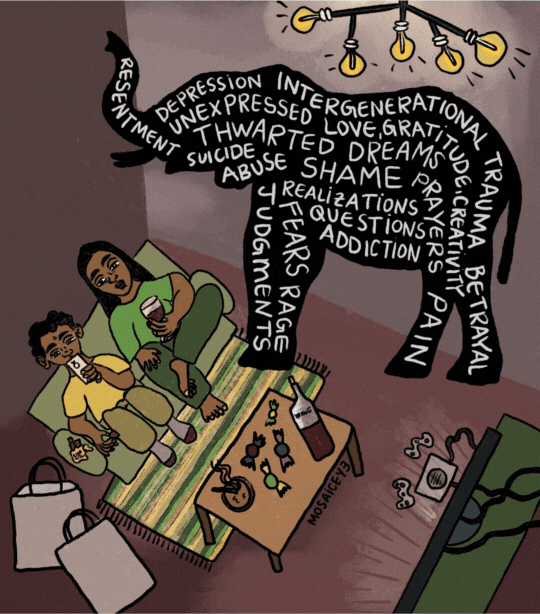Hi dear reader, I welcome your support of this publication by:
Sharing Chetna Unfolding with people you love
Getting a book on abundance mentality and/or playful devotion
Getting a poster to adorn your space with compassionate reminders
Applying for a discovery call to work with me 1:1 for your Creative Alchemy™
Joining The River, a membership space for community confluence & creative ever~flow
Thank you 💚
Firstly, I love elephants and this idiom of “elephant in the room” throws too much shade at our majestic gentle giants but, these words also really capture how big and heavy it is to deny…
I learned this phrase, “don’t feel, don’t speak, don’t trust” from the body of work known as Adult Children of Alcoholics and Family Dysfunction.
“Don’t feel, don’t speak, don’t trust” are rules that some of us learn from our first relationships and/or cultures to preserve secrecy, shame, isolation, suffering and dysfunction of our early ecosystems.
I’ve heard words like, “don’t cry, it’s not a big deal” or “you’re overreacting” or “just be positive!” or “you’re still on that?!” when bringing up a wound from the past that was unresolved. We live in a culture that tells us to hide our sadness or insecurity behind active IG posts, humor or light and agreeable banter at gatherings. It’s easy to internalize these messages and mask our emotions so as to not be burdensome or discomforting to others. For me, not feeling has lead to cannabis addiction and bouts of depression, including suicide ideation.
Messages like “don’t air our dirty laundry” or “keep family matters private,” are a big thing in many of our families concerned with “saving face” and “log hya kahenge.” Human struggles like addiction, abuse, and mental illness thrive in the shadows and grow heavier as we stay silent about the experiences and struggles of it. This silence can prevent us from seeking help or understanding, keeping us trapped in generational cycles of trauma. Not speaking has lead me to isolation, social anxiety, and deep loneliness behind thick masks.
It can be a common “lesson” that trusting others leads to disappointment or betrayal; “you can only rely on yourself” or “don’t trust anyone, they’ll just let you down” not only fuels isolation but a delusional individualism. This fosters a sense of guardedness and suspicion, making it hard to build meaningful connections. Not trusting has caused me resentment, bitterness, and choosing people who don’t have capacity to be reliably present or available. A classic self-fulfilling prophecy.
So much of the cultural and societal waters that I and we are soaked in also reinforce the message of “don’t feel, don’t speak, don’t trust” when it comes to human experiences like sadness, sex, fear, money, apathy, rage, envy, joy, pleasure, hatred, etc.
Whether in liberal activist groups, spiritual groups, or conservative supremacist groups, social “appropriateness” is often policed by these “don’t feel, don’t speak, don’t trust” rules. In either space, sticky binaries can be justified- especially in times of such high stakes, genocide of children and entire lineages, political shit shows and climate degradation. One could be “cancelled” or cut off for not being in alignment. These group-specific norms dictate what emotions are acceptable to feel, what topics or opinions are allowed to be discussed, what questions are deemed worthy to ask, and what way of being is morally righteous.
When we internalize these rules, we carry the weight of unresolved emotions and unspoken truths. It’s a 13,000-pound burden to bear.
It takes a diligence and devotion to practice feeling all our feelings; to practice speaking and listening, even when it’s scary or controversial; to practice trusting with discernment, and being trustworthy.
(The rest of this essay involves a personal story that I prefer to reserve for my paid subscribers. If you’d like full access to this piece and our monthly live Alchemy Circles for presence in space together, please become a patron.)





